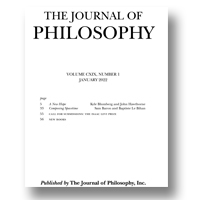|
1.
|
The Journal of Philosophy:
Volume >
121 >
Issue: 4
Daniel Muñoz, Nathaniel Baron-Schmitt
Wronging Oneself
abstract |
view |
rights & permissions
| cited by
When, if ever, do we wrong ourselves? The Self-Other Symmetric answer is: when we do to ourselves what would wrong a consenting other. The standard objection, which has gone unchallenged for decades, is that Symmetry seems to imply that we wrong ourselves in too many cases—where rights are unwaivable, or “self-consent” is lacking. I argue that Symmetry not only survives these would-be counterexamples; it explains and unifies them. The key to Symmetry is not, as critics have supposed, the bizarre claim that we must literally give ourselves consent if we are to avoid wronging ourselves. Instead, it is that we authorize ourselves simply by making decisions, just as we can authorize others by making decisions jointly.
|
|
|
3.
|
The Journal of Philosophy:
Volume >
121 >
Issue: 4
Tomasz Zyglewicz
Wanting Is Not Expected Utility
abstract |
view |
rights & permissions
| cited by
In this paper, I criticize Ethan Jerzak’s view that ‘want’ has only one sense, the mixed expected utility sense. First, I show that his appeals to ‘really’-locutions fail to explain away the counterintuitive predictions of his view. Second, I present a class of cases, which I call “principled indifference” cases, that pose difficulties for any expected utility lexical entry for ‘want’. I argue that in order to account for these cases, one needs to concede that ‘want’ has a sense, according to which wanting is a matter of subjectively preferring p-alternatives to not-p-alternatives. Finally, I introduce some considerations for and against the view that ‘want’ also has another sense, which is roughly synonymous with ‘need’.
|
|
